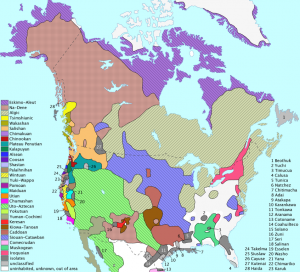Readings
Native American Perspectives on the Environment
The Native American scholar Jace Weaver has written extensively about Native perspectives on environmental topics.
Native American populations have long viewed environmental challenges as significant and have been at the forefront of such concepts as ‘eco-justice’.

The growth of settlements throughout the Western Hemisphere and the establishment of nation-states by the late 18th and early 19th century resulted in many Native peoples within the hemisphere reduced to the status of “domestic dependent nations.” New governments throughout the hemisphere took control of most Native lands.
The visualization of land lost portrayed in the video above only includes the loss of land influenced by British expansion– it does not explicitly incorporate the ways in which the Spanish, the French and the Dutch were involved- If these were to be incorporated the visual impact would be much more dramatic than this representation portrays.
Of primary concern for many Native populations were the ways in which new laws established rights over land and obstructed the sovereignty of Native peoples to govern themselves. In most cases treaties and legislation were not utilized as grants of power to Native groups, but instead were used to determine the rights of the federal government.
Leaving tribal governments with only the ability to exercise authority over Native lands is known as a “clipped sovereignty.” Simply put, it is a limited sovereignty.
By the late 1800s and early 1990s many western nation-states began to enact comprehensive land-use regulation– a series of legal battles resulted asserting the right to intervene and regulate the environment on Native lands.
And, although it is assumed that Native nations have the authority to regulate the environment when it comes to nations with reservations, in many cases those rights have not been protected.
One of the most fought over resources across the hemisphere are water, air and wildlife. The migratory nature of these means that Native nations struggle to control what the quality of these within and beyond the borders of their nations.
Off reservation pollution affecting the health and welfare on reservations should in theory provide a basis for assertion of Native intervention, but instead legally in many countries across the hemisphere tribal sovereignty is more limited.

